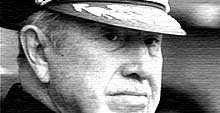08/08/02: Latest update on the Blowback campaign to indict General Pinochet
Posted by: BLOWBACK

Recap of our meeting with the US Attorney for the District of Columbia.
BLOWBACK CAMPAIGN: INDICT GENERAL PINOCHET
Three days ago, we met again with Dan Seikaly, chief of the Criminal Division of the office of the US Attorney for the District of Columbia, on Monday 5 August 2002 and delivered 49 petition letters BLOWBACK had gathered during a few gigs in the Northeast and a few in the greater Los Angeles area. This was the petition letter you signed calling on the U.S. Attorney for the District of Columbia to indict Chilean General Pinochet for ordering the 1976 car bombing in Washington, DC which killed two people. In the letter you noted that since the office of the U.S. Attorney was divided on the question of whether or not there was enough evidence to prosecute, they should indict so that a jury could decide that.
Seikaly said that although there is public interest in getting General Pinochet indicted, the office of the U.S. Attorney does not have the authority to do anything but file a document (indict). The full operation, including extraditing the General from Chile, is one that involves the entire US Government. Seikaly said that his office should not file an indictment if they do not intend to prosecute. “When we file,” he added, “we do so with the intention of battling until we see the prosecution through, like in the case of the terrorist bombing of the Pan Am flight in 1988.”
When Seikaly and I last met in April of this year (when I delivered another 50 petitions), he had mentioned that a memorandum to the Department of Justice from their office was due out in the next few weeks, even in the next six weeks. Now he told me that was no longer the case. I asked what had changed? He replied that the ruling by the Chilean Supreme Court, stating that General Pinochet is mentally unfit to stand trial, had influence, as was the fact that there are so many other issues vying for attention, like ENRON and WorldCom and Massaoui.
We had a lot of back and forth on the question of where does the decision-making power to indict rest? While clearly the US Attorney for the District of Columbia must make this decision, Seikaly pointed out that there were many other factors involved in this decision, that gone were the days when an agency could act alone and proceed to prosecute without taking into account the views of other agencies. As they had, he said, in the early days of the case, characterizing their early action as “aggressive,” resulting in three guilty pleas.
We returned to the question of the evidence. In the petition, based on the last meeting with Seikaly, we noted that there is internal division in the US Attorney’s Office about the question of whether there is enough evidence to successfully prosecute. Seikaly pointed out that he personally did not believe there was enough and while ensuring I understood he did not speak on behalf of the US Attorney, he said that often U.S. policy proceeds on intelligence and information that is enough to base policy on but is insufficient for the successful criminal prosecution of someone, convincing a jury of their culpability “beyond a shadow of a doubt.” As an example he cited the case of Lybian dictator Muammar Qaddafi who U.S. policymakers were sure was behind the Pan Am bombing but did not have enough evidence to prosecute him.
I asked what kind of evidence it would take and he said that if former DINA (secret police) chief Contreras or anyone in a position to know would state that they knew Pinochet knew or that they told Pinochet but he said nothing or that Pinochet had ordered the attack, then that would be enough to seek the indictment.













cheap car insurance wrote: